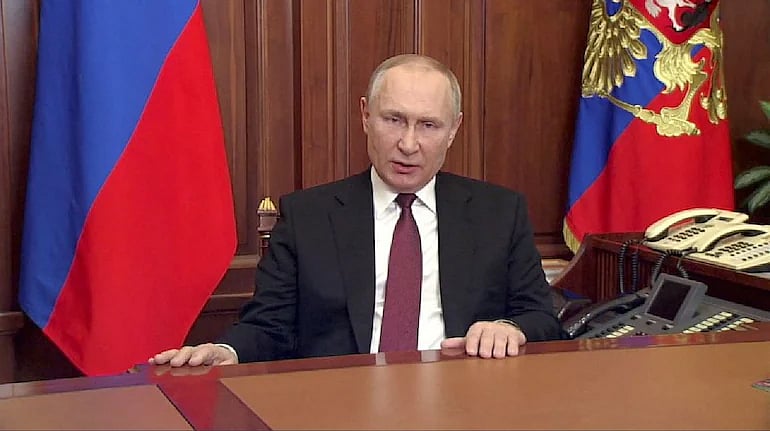There were times whenpolitical turmoil in Pakistan would have been the lead news in Indian media. Prime Minister Imran Khan’s fate is eliciting more curiosity than concern. The reason is selfevident that in a world flooded with news, which arrives instantly on the phone via Twitter or Facebook, the trite can often stump events with wider impact. The Will Smith slap will always muscle out the best picture award at the Oscars. But closer examination will always reveal the significance of passing events. Pakistan is a case in point.
The tribulations of Imran do not appear immediately relevant to India because India-Pakistanrelations havebeenina state of frozentension since the 2019 Pulwama attack, which cost the lives of forty Indian securitypersonnel.It washopedthat Pakistan’s measured response to India’s retaliatory airstrike and quick return of the Indian pilot would create the environmentfor dialogue, after the Lok Sabha election, just weeks away. But that wasnotto be as BJP’s domestic agenda overtook its diplomatic priorities in the western neighbourhood. The abrogation of Article 370 and division and downgrading of Jammu and Kashmir from state to union territory poisoned the atmosphere. Both China and Pakistan took exception to it. Whatever the constitutional propriety of the move, on which a fivemember Constitution Bench of the Supreme Court has still not ruled, the national security implications have been obvious.
Chinese multi-pronged incursions across the Line of Actual Control (LAC) in Ladakh in May 2020 can of course be attributed both to border infrastructure building by India and, as Chinahas argued,to India altering the status quo in the “disputed” state of Jammu and Kashmir. But, one obvious consequence has been that the tacit alliance between China and Pakistan has now become blatant and confrontational. Also, the focus shifted from India-Pakistan relations to the stand-off with China, although Pakistan now presents amore complexchallenge, as India cannotignore the possibility of a two-front war. Even domestically, BJP’s Kashmir policyhas beenjustified by mutating arguments as the original ones proved invalid. Now, the issue has been hijacked by the film Kashmir Files, which portrays the ethnic cleansing of Kashmiri Pandits from the state in a provocative and politicised manner.
Common sense dictates that when confronting two antagonists the diplomatic aim should be to keep them from uniting against you. But when domestic politics take precedence over foreignpolicythe taskbecomes onerous. Atthe very least,the internal political developments in Pakistan should be of interest to India. The fate of Imran Khan seems sealed as not only does he have dissidence in his own party, which in any case lacks a majority in the National Assembly,butmost supporting allies have abandoned him. The last to jump ship is the Sind-based MQM. Multiple scenarios are now possible.
PM Imran Khan has refused to resign and seems determined to face the parliament. His party has filed two pleas in the Supreme Court. Earlier they sought the anti-defection law to be applied pre emptively, to corner the dissidents in his own party. More recently, they want an enquiry into his charge of foreign interference to depose him, based on a letter he keeps pulling out of his pocket without revealing the contents so far. Apparently, it is a communication from the foreign ministry’s records. He addressed a big public gathering over the past weekend. His desire to address the nation on television has been deferred or stopped, probably by the military. Gen. Qamar Javed Bajwa, Pakistan’s chief of the army, and his Director General Inter-Services Intelligence (ISI) met PM Khan on March 30 twice. They would have opposed the prime minister making his charges of foreign conspiracy on national televisionas that would also impugn the army, which is no longer backing Khan.
Imran Khan may lose his position as prime minister, but his rabblerousing of the masses shall persist. Much like former US President Donald Trump, using his charismatic personality he wants to make his case before the public, which he is convinced is withhim. His projected religiosity, complete with his burqaclad wife-cum-spiritual adviser, and anti-US rhetoric may help him retain electoral relevance despite poor economic performance and his divisive politics. China rolled over a $ 4.2 billion immediately repayable loan, in the middle of the political drama.
The air may be cleared after a general election.It is also possible that a fragmented mandate may emerge due to a three-way fight. This may cause more uncertainty and rampant political deal-making. The Pakistani army has been hinting at a more accommodative approach to India. With Imran gone, the generals get a greater say in Indian policy, whoever be the prime minister. BJP is finishing its agenda for change with the delimitation exercise in Jammu and Kashmir being almost complete. Elections there canbe preceded or followed by delineation of a path towards restoring statehood. Thereafter, if political cycles in India and Pakistan synchronise, IndoPak relations may begin thawing and the SAARC summit resume.
The writer is former secretary, Ministry of External Affairs







